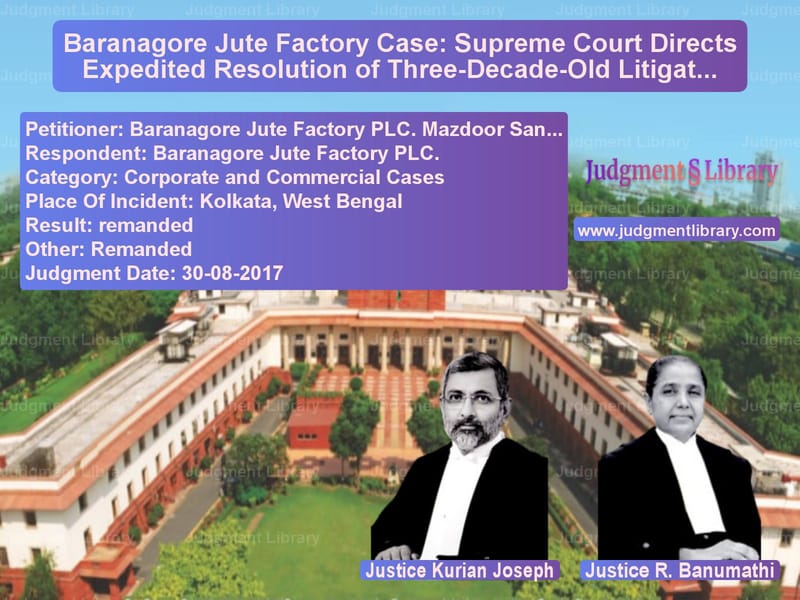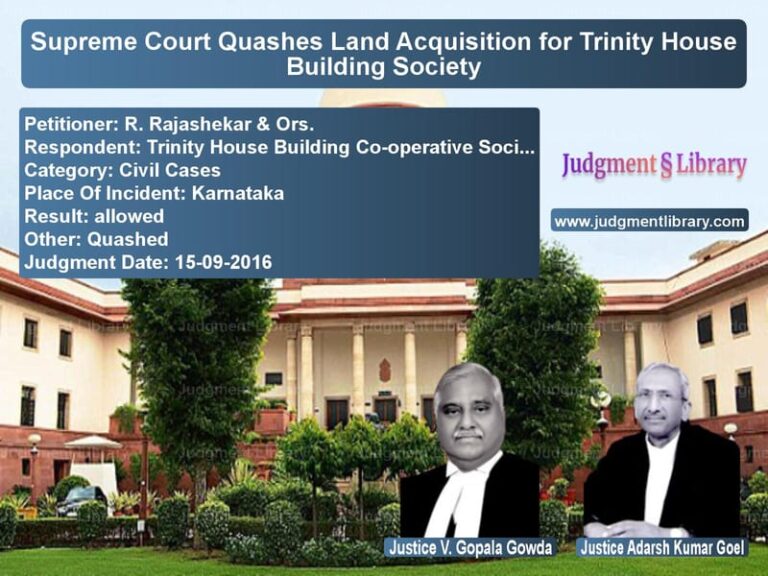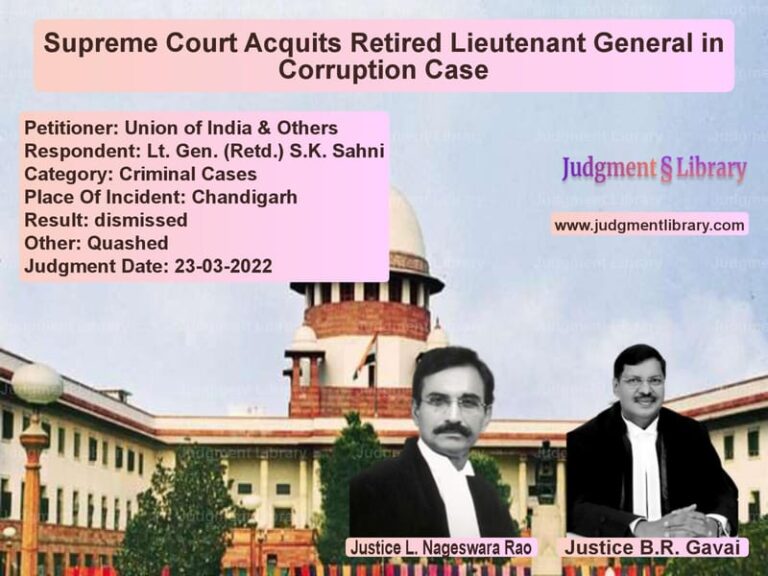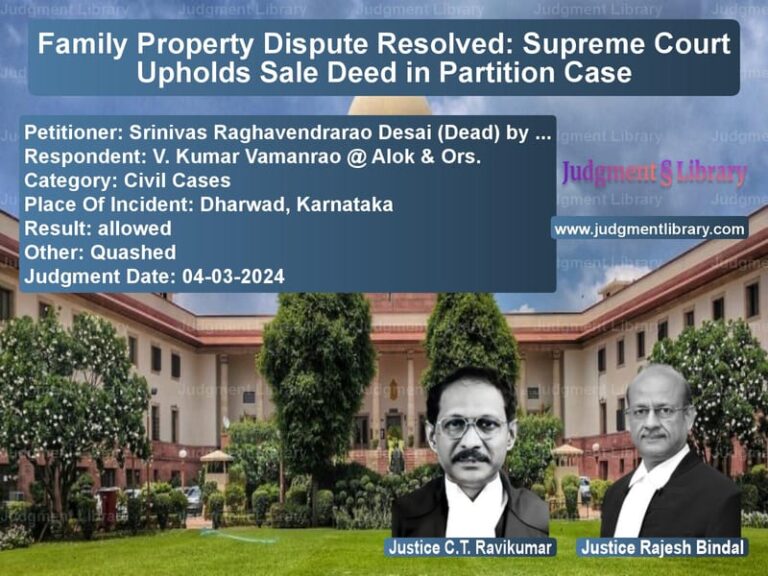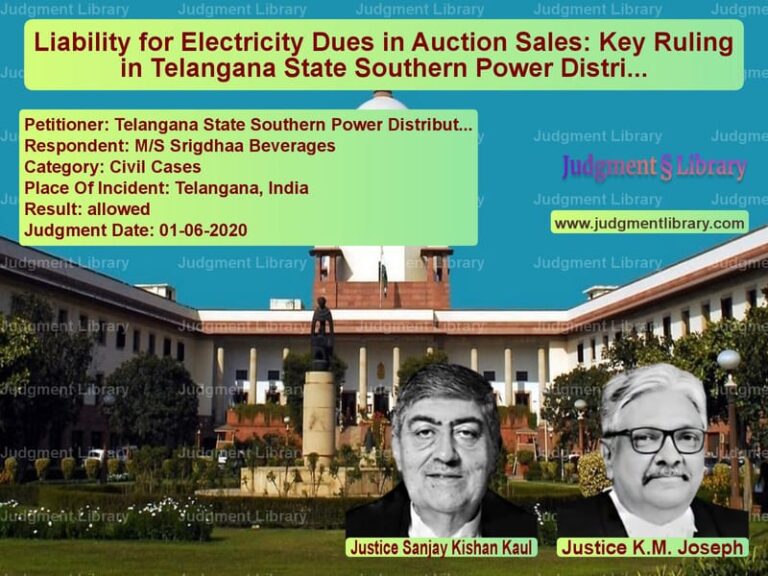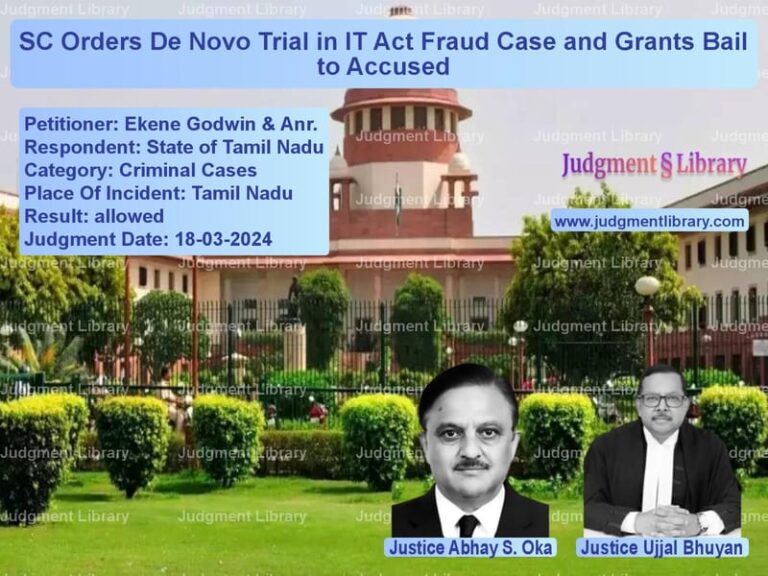Baranagore Jute Factory Case: Supreme Court Directs Expedited Resolution of Three-Decade-Old Litigation
The case of Baranagore Jute Factory PLC. Mazdoor Sangh (BMS) vs. Baranagore Jute Factory PLC. has been an ongoing legal battle spanning over three decades. The Supreme Court was faced with contempt petitions arising out of an order issued in 2017 regarding financial security deposits and operational control over company funds. The case highlights the prolonged legal struggles over the company’s management and financial liabilities.
Background of the Case
The dispute originated from Company Petition No. 2 of 1987, pending before the Company Judge of the Calcutta High Court. This petition led to multiple rounds of litigation, first before the Company Judge, then in intra-court appeals, and finally before the Supreme Court. Despite numerous directives, the company petition had yet to be resolved.
The Supreme Court, while reviewing contempt petitions against various stakeholders, expressed its concerns over the prolonged legal battle, stating:
“One wonders why, despite several directions by this Court, the Company Petition itself has not been disposed of.”
With this in mind, the Court set out to enforce its previous orders while ensuring that the company proceedings were finally brought to a conclusion.
Arguments Presented
Petitioner’s Arguments (Baranagore Jute Factory Mazdoor Sangh – BMS)
The petitioners contended that:
- The respondents had failed to comply with the Supreme Court’s earlier directives regarding financial security deposits.
- The respondents had attempted to circumvent the Court’s orders through various corporate maneuvers, including forming a new company.
- There were unauthorized withdrawals from company accounts, violating the Court’s restrictions on fund usage.
- The financial security deposit of ₹10.55 crores had not been maintained as per the Supreme Court’s instructions.
Respondents’ Arguments (Baranagore Jute Factory PLC and Directors)
The respondents countered by stating:
- There was no deliberate or willful violation of the Supreme Court’s orders.
- The deposit of ₹10.55 crores had been made, as instructed, in the name of the Registrar of the Supreme Court.
- The alleged unauthorized withdrawals were inadvertent and had been reversed by the bank.
- The company was in the process of restructuring, and all actions taken were within the legal framework.
Supreme Court’s Observations
The Supreme Court noted multiple instances where the respondents had failed to properly comply with its earlier directives. It stated:
“It is clear that their conduct was not graceful before this Court and whether for such conduct this Court should initiate proceedings for contempt is the question to be decided.”
Regarding the financial security deposit, the Court observed:
“The learned counsel for Respondent No.1, on proper instruction, submits that in order to avoid all confusions, a Fixed Deposit Receipt for an amount of Rs. 10.55 Crores drawn in the name of the Registrar of this Court will be produced before this Court on the next date of hearing.”
The Court also noted discrepancies regarding an earlier deposit of ₹2.23 crores, which was initially reported to be in Axis Bank but was later found in other banks. The respondents failed to inform the Court of this inconsistency in a timely manner.
Final Judgment
The Supreme Court directed that:
- The Company Judge of the Calcutta High Court must dispose of the pending Company Petition No. 2 of 1987 on a priority basis.
- The High Court must conduct day-to-day hearings and dispose of the petition within four months.
- Any adjournment sought by any party would be granted only upon payment of ₹10 lakhs as a cost, and such adjournments would be for a short duration only.
- Should the respondents fail to cooperate, the High Court would have the authority to report back to the Supreme Court, which may then consider appointing a Receiver to take over the company.
- The Company Judge was directed not to entertain any fresh applications related to Company Petition No. 2 of 1987 without prior permission from the Supreme Court.
- The financial security deposit in the name of the Supreme Court Registrar would be subject to the final outcome of the Company Petition.
The Supreme Court also addressed concerns regarding unauthorized withdrawals from company accounts. It accepted an unconditional apology from the Axis Bank Manager and discharged further contempt proceedings against the bank.
However, regarding the conduct of the respondents, the Court made it clear:
“The Company Court is in seisin of the matter for about three decades… All the parties appearing before us submit that they will extend full cooperation to the Company Judge to dispose of the applications and the Company Petition itself without any delay.”
Implications of the Judgment
This ruling carries significant legal implications, particularly for corporate disputes that remain unresolved for extended periods:
- The Supreme Court has reinforced its authority in ensuring that lower courts comply with its orders.
- It established a precedent for imposing heavy costs on parties that seek unnecessary adjournments, thus discouraging delay tactics.
- By reserving the right to appoint a Receiver, the Court has signaled its willingness to take control of the company’s management if required.
- The ruling ensures that the financial security deposit remains intact until the High Court’s final decision.
- Company disputes must be resolved in a time-bound manner to prevent prolonged legal uncertainty.
Conclusion
The Supreme Court’s intervention in the Baranagore Jute Factory case serves as a landmark decision aimed at expediting the resolution of corporate disputes that have dragged on for decades. By enforcing stringent deadlines and monetary penalties for delays, the Court has sent a strong message to all parties involved. The ruling ensures that the long-pending dispute over the company’s management and finances will finally reach a resolution under judicial oversight.
Don’t miss out on the full details! Download the complete judgment in PDF format below and gain valuable insights instantly!
Download Judgment: Baranagore Jute Fact vs Baranagore Jute Fact Supreme Court of India Judgment Dated 30-08-2017.pdf
Direct Downlaod Judgment: Direct downlaod this Judgment
See all petitions in Bankruptcy and Insolvency
See all petitions in Company Law
See all petitions in Corporate Governance
See all petitions in Judgment by Kurian Joseph
See all petitions in Judgment by R. Banumathi
See all petitions in Remanded
See all petitions in Remanded
See all petitions in supreme court of India judgments August 2017
See all petitions in 2017 judgments
See all posts in Corporate and Commercial Cases Category
See all allowed petitions in Corporate and Commercial Cases Category
See all Dismissed petitions in Corporate and Commercial Cases Category
See all partially allowed petitions in Corporate and Commercial Cases Category

